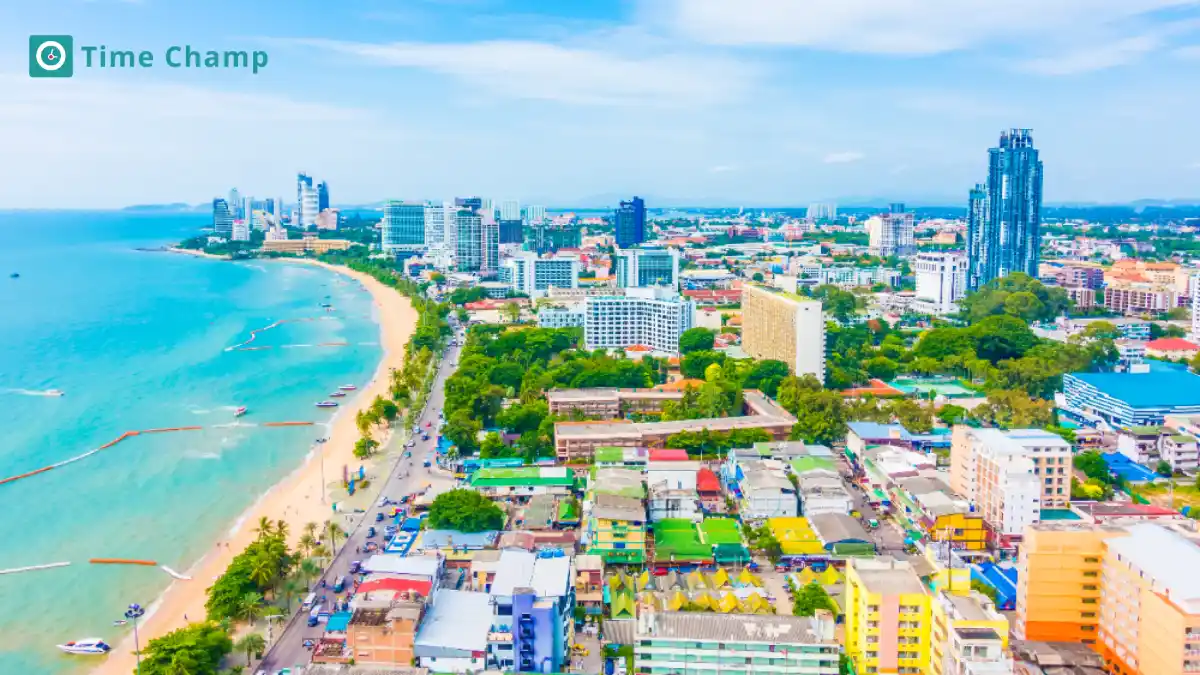Are you curious about knowing the average salary in Philippines?
The Philippines is quickly emerging as one of the top primary outsourcing destinations because of its skilled workforce and competitive wages. This makes the Philippines an attractive choice for outsourcing than some of the developed countries like the UK, Switzerland, or the USA.
According to the Salary Explorer, the average salary in the Philippines is around 537,000 PHP, which corresponds to about 9099.69 USD.
In this article, we will explore the average salary in Philippines, minimum and maximum wages, factors influencing it, different salary comparisons, best outsourcing companies, key reasons why the Philippines leads in outsourcing, and how you can boost your Philippines outsourcing team productivity. Let’s dive in!
Philippines Average Salary
The average monthly salary in the Philippines is around 44,800 PHP, corresponding to about 759.15 USD according to the survey conducted by Salary Explorer.
The average yearly salary in the Philippines is around 537,000 PHP, which equals 9099.69 USD.
Minimum Salary Wage
According to the National Wages and Productivity Commission, the minimum wage rate in Philippines is 608.00 PHP to 645.00 PHP (10.30 USD to 10.93 USD).
Minimum salary wages in the Philippines vary depending on the region and industry. According to the Department of Labor and Employment report, workers in Metro Manila earn 570 PHP to 610 PHP per day which corresponds to 9.66 USD to 10.34 USD because of the high cost of living in 2024.
In Eastern Visayas, wages increased by 30 PHP (0.51 USD) in 2024, raising the daily rate from 405 PHP to 435 PHP (6.86 USD to 7.37 USD) depending on the job. Agricultural workers and employees in small retail businesses earn less amount.
Wages are adjusted based on local economic conditions. Some regions pay less than 290 PHP to 326 PHP (4.91 USD to 5.52 USD) daily wages. In Eastern Visayas, domestic workers’ monthly pay increases to 500 PHP corresponding to 8.47 USD. Now, they receive 5,500 PHP to 6,000 PHP (93.20 USD to 101.67 USD).
Below are the current daily minimum wage rates in the Philippines:
| Industry / Sectors | Current Minimum Wage Rate | New Increase Wage Rate | New Minimum Wage Rates |
|---|---|---|---|
| Non-Agriculture | 610.00 PHP (10.41 USD) | 35.00 PHP (0.60 USD) | 645.00 PHP (11.00 USD) |
| Manufacturing regularly employing less than 10 workers | 573.00 PHP (9.77 USD) | 35.00 PHP (0.60 USD) | 608.00 PHP (10.37 USD) |
| Service/Retail Establishments employing 15 workers or less | 573.00 PHP (9.77 USD) | 35.00 PHP (0.60 USD) | 608.00 PHP (10.37 USD) |
| Agriculture (Plantation and Non-Plantation) | 573.00 PHP (9.77 USD) | 35.00 PHP (0.60 USD) | 608.00 PHP (10.37 USD) |
Source: National Wages and Productivity Commission
Median Salary
The median salary in the Philippines is estimated to increase by around 15,600 PHP (264.93 USD) per month in 2024 if the same growth continues in median salaries. This estimate shows that workers’ earnings are expected to keep improving steadily across different industries. The median average salary is not constant, it always varies by profession, industry, and location.
The median wage shows that half of the full-time workforce of the Philippines earned less than or equal to this amount. At the same time, the other half of the workforce earned more than this median amount. Professionals in high-demand sectors, such as technology, finance, and healthcare, often receive higher pay compared to those in retail or agriculture.
According to the latest information from the Philippines Statistics Authority (PSA), the median wage salary in the Philippines is 4,588 PHP (247.75 USD) per month in 2022. In 2020, the median salary was 13,6464 PHP (13,646 USD), which clearly shows that there is a 6.9% growth in 2022 pay rates.
Maximum wage
According to the Philippines Salary Grade 2024, the maximum wage in the Philippines in 2024 is 428,994 PHP (7329.16 USD) per month. This maximum salary is based on Grade 33. This level of grade is reserved for top government officials in the Philippines. To earn this higher salary, only the level of expertise in fields is not sufficient, employees also need to carry so many responsibilities based on their roles. And also, the employees who work in the technology and healthcare industries earn higher salaries.
Top 5 Highest Paying Jobs in the Philippines
Below are the top 5 highest-paying jobs across various industries in the Philippines in 2024.
| Profession | Average Monthly Salary |
|---|---|
| Aircraft Professionals | 135,363 PHP (2311.74 USD) |
| Lawyers | 89,000 PHP (1519.95 USD) |
| Software Developers | 70,506 PHP (1204.11 USD) |
| Mathematicians and Actuaries | 70,000 PHP (1195.47 USD) |
| Geologists | 49,059 PHP (837.83 USD) |
Source: SB Finance
Factors Influencing Average Salary in Philippines
Average Salary by Occupation
| Occupation | Average Salary (per year in PHP) | Average Salary (per year in USD) |
|---|---|---|
| Digital Marketing Manager | 4,200,000 | 71643.64 |
| Search Engine Optimization Manager | 2,500,000 | 42645.03 |
| Human Resource Manager | 2,000,000 | 34116.02 |
| Data Scientist | 1,300,000 | 22175.41 |
| Front-end Developer | 1,200,000 | 20469.61 |
| Sales Manager | 1,185,000 | 20213.74 |
| Accountant | 898,000 | 15318.09 |
Average Salary By Industry
| Industry | Average Salary (per year in PHP) | Average Salary (per year in USD) |
|---|---|---|
| Accounting & Finance | 645,000 – 6,500,000 | 11002.42 – 110877.07 |
| Digital | 1,300,000 – 6,000,000 | 22175.41 – 102348.06 |
| Engineering & Manufacturing | 600,000 – 4,800,000 | 102348.06 – 81878.45 |
| Executive | 5,200,000 – 12,000,000 | 88701.65 – 204696.12 |
| Human Resources | 2,000,000 – 5,000,000 | 34116.02 – 85290.05 |
| Marketing | 896,000 – 5,200,000 | 15283.98 – 88701.65 |
| Procurement & Supply Chain | 481,000 – 4,200,000 | 8204.90 – 71643.62 |
| Sales | 1,011,000 – 6,500,000 | 17245.65 – 110877.07 |
| Technology | 960,000 – 6,000,000 | 16375.69 – 102348.06 |
Source: Michael Page Philippines Salary Guide 2024
Average Salary By City
| City | Average Salary (per month in PHP) | Average Salary (per month in USD) |
|---|---|---|
| Manila | 53,400 | 910.90 |
| Antipolo | 49,100 | 837.55 |
| Kalookan | 51,700 | 881.90 |
| Paranaque | 46,600 | 794.90 |
| Valenzuela | 45,600 | 777.85 |
| Quezon City | 54,300 | 926.25 |
| Makati | 44,000 | 750.55 |
Source: Salary Explorer
Salary Comparisons in the Philippines
Below are the salary comparisons in the Philippines based on education and years of experience.
By Education
| Education Level | Income Difference Compared to the Previous Education Level |
|---|---|
| High School Diploma | Base Level |
| Diploma Certificate | 17% higher than High School |
| Bachelor’s Degree | 24% higher than Diploma Graduate |
| Master’s Degree | 29% higher than a Bachelor’s Degree |
| PhD | 23% higher than a Master’s Degree |
Source: Salary Explorer
By Years of Experience
How does work experience influence salaries? Having years of experience greatly increases an employee’s salary in the Philippines because experience is still an important factor in remuneration in a variety of industries.
- In general, workers with 2 to 5 years of experience receive roughly 32% more than those with less experience.
- Professionals with more than 5 years of experience normally enjoy a 36% pay rise over those with less than 5 years.
- The pay increases by 21% for people with 10+ years of experience and by 14% for those with more than 15 years.
These statistics give you an overview of salary comparisons based on years of experience in the Philippines. These are not constant pay rates; they may vary depending on industries or employees’ job roles.
Top 3 Best Outsourcing Companies in the Philippines
Outsourcing to the Philippines is a smart decision for many businesses. Here are three top companies you can trust to handle your outsourcing needs:
1. Accenture
Accenture is one of the best outsourcing companies in the Philippines. It is offering services mostly in IT, customer support, and finance sectors. Accenture helps your business to improve operations and deliver high-quality services with the help of its strong team in that country. They use advanced technologies and expertise in each work which makes them a reliable partner for growth.
2. Teleperformance Philippines
Teleperformance company is best for outsourcing in the Philippines because of its good customer service. The company has so many branch offices in different locations in the Philippines country. Teleperformance has a well-experienced team providing the best customer support and digital services for its clients. This makes the company a better choice for outsourcing businesses in different sectors.
3. Concentrix
Concentrix is the best outsourcing company in the Philippines because it can enhance engagement with your customers and increase your business growth. Concentrix provides a wide range of opportunities for you such as customer care, sales, and technology solution services. Their expertise makes your business operations run smoothly. And they can interact and solve your customer issues with care and professionalism.
How Lower Outsourcing Wages Benefit Your Business & Filipino Workers
Outsourcing in the Philippines offers more than cost savings. Lower wages help you create a strong, and productive workforce that supports your business growth and boosts the local economy.
Lower Costs of Living
You can save your money and also support local professionals in the Philippines outsourcing. Because the Philippines has lower living expenses than some of the other countries. Even if you offer valuable wages to Filipino workers, still it costs less for your business. While you reduce your operational expenses, employees also enjoy a comfortable lifestyle with these competitive salaries you offer them.
- One-bedroom apartment in city center costs around 16,935 PHP (293.00 USD) per month.
- Basic utilities cost ranges from 3,500 PHP to 10,625 PHP (60.56 USD to 183.84 USD) per month.
- Prices for basic groceries are around 53 PHP –117 PHP (0.92 USD – 2.02 USD) for milk, bread, rice and eggs.
- The average monthly transportation cost in the Philippines can be estimated at 600 PHP (10.38 USD) based on the price of a regular public transport pass.
- Mobile plans with data costs around 1,797 PHP (31.09 USD) per month.
High Job Opportunities
Outsourcing to the Philippines may give you access to hire a large number of highly qualified individuals who are ready to support companies worldwide. Many Filipino professionals have the capability to bring their expertise to your company. These workers can improve their lives when you offer jobs to them and you also gain benefits by providing lower salaries compared to other countries.
Economic Stability for Families
Filipino laborers can support their families by earning a consistent income through outsourcing jobs. Stable and secure jobs help them handle daily expenses perfectly. These types of jobs also help them in money saving and improving their lives. You can create lots of opportunities for Filipino workers which brings financial security and provides support to their families to pay for children’s education, and healthcare, and to fulfill some other basic needs.
Four Key Reasons Why the Philippines Leads in Outsourcing?
Here are the 4 important reasons you need to know why the Philippines is the best choice for outsourcing compared to other countries.
1. Cost-Effective Skilled Talent
You can get a workforce who has excellent talent at affordable pay rates in the Philippines. If you hire those workers, you gain access to professionals who are experts in various fields while staying within your budget. Filipino workers deliver the knowledge and skills needed to meet your business requirements effectively. When you balance both cost and talent without compromising quality it helps to support your company’s growth. Hiring from the Philippines ensures excellent value for your investment.
2. Proficiency in English
In the Philippines, you can easily find excellent professional workers who are good at English communication. You can collaborate without facing any communication issues with your Filipino teams. Because they can understand your instructions clearly which helps to make smooth workflows and easy adaptation to your processes. That’s why they are well suitable for customer support roles and global operations.
3. Tax Advantages
The Philippines tax incentives support foreign businesses. You can reduce your operational expenses and increase savings from these tax advantages. Especially, such type of policies attracts international companies to invest and expand their services in this region. Philippines outsourcing is the best practical and cost-effective solution for your business to enhance profitability.
4. Ensuring Data Security and Privacy Compliance
The Philippines country follows strict data security and privacy laws to secure important information from cybercriminal thefts. Filipinos are always committed to meeting international standards in security. In this country, almost all businesses use secure systems and practices to keep your data safe. It builds trust in your operations along with making sure that compliance with regulations. You can feel confident about your data protection in the Philippines.
How Can You Boost Productivity in Your Outsourced Philippines Team?
Clear Communication
You can set expectations in a way that avoids mistakes. Explain your goals and deadlines that are easy to understand to your outsourcing teams. You can maintain a simple and effective process to communicate with your team. For instance, it’s better to use email or instant messaging for better communication. When your team needs more information, you can ask and encourage them to ask questions. Then everyone in your team understands and works more efficiently knowing updates regularly without missing.
Foster Collaboration and Team Spirit
You can give chances to your team to work together on the company’s tasks and projects. You always connect with your team by making video calls and conducting team meetings. You can encourage them to complete your business projects within the deadlines by working together. You can give your support and guidance to the team. You can also create a positive environment where everyone in your team feels appreciated and motivated to work more efficiently.
Implement Time Tracking & Productivity Tools
You can use tools to help your team in managing their time better. It’s a good idea to monitor your outsourcing team’s productivity effortlessly using employee productivity monitoring software like Time Champ. You can also track your employees’ time like how much they are spending to complete their tasks using time tracking software. You can set your organization’s goals clearly and review them regularly with your team. These tools keep everyone in your team focused and help to improve efficiency.
Enhance Your Outsourcing Team Productivity Using Time Champ
Outsourcing team management can be difficult. You might struggle with inefficiencies that will slow down work progress and have an impact on the results you get. When your team is remote, or distributed, issues like tracking attendance, monitoring performance, or managing projects can feel overwhelming.
The Solution? Time Champ!
Time Champ is the best employee time tracking and productivity software to enhance your Philippines outsourcing team productivity effectively.
Don’t waste your time and effort trying to track your outsourcing employees’ attendance manually. If mistakes happen, it’s hard to achieve success in your business. You can easily automate your attendance tracking accurately using Time Champ. Not only attendance, Time Champ’s time tracking feature tracks your employees’ work hours like how much time they are working, non-working, and idle or taking breaks.
You can also monitor your Filipino workers at any time by capturing screenshots, screen recordings, keystrokes, and mouse click detection. You can track their productivity easily using the Time Champ Productivity tracking feature. Then it’s easy for you to find who is more productive or non-productive in your team by tracking each employee’s productive time, unproductive time, and neutral time.
Your project management with your outsourcing team becomes easy using Time Champ. You can manage your projects and assign tasks to your teams. You can assign team members who need to work on which project. Set deadlines to complete projects within time, and manage your budgets, and workflows effortlessly. Time Champ simplifies your payroll process by generating automated timesheets based on employee work hours.
Final Thoughts
In summary, understanding the average salary in the Philippines shows the country’s growing opportunities across multiple areas, particularly in outsourcing. The Philippines offers an exceptional outsourcing opportunity. You can get a chance to hire skilled Filipino workers with affordable wages. You can also build a strong team with your Filipino outsourcing employees to improve your business growth. Understanding local salary trends and using smart management tools help you create a winning strategy that benefits both your company and Filipino professionals.
Simplify the complexities of remote team management.
Sign up for Time Champ now and boost your outsourced team’s productivity like never before.
Signup for FreeBook DemoFrequently Asked Questions
A good salary in the Philippines depends on location and role. In cities like Metro Manila, 30,000 PHP to 50,000 PHP (511.78 USD to 852.97 USD) is competitive, while in smaller cities or rural areas, 20,000 PHP to 30,000 PHP (341.19 USD to 511.78 USD) is sufficient. Fair and competitive pay helps attract and keep talented employees.
Salaries in the public sector are generally lower than in the private sector for similar roles. However, public sector jobs offer greater job security, comprehensive benefits, and structured salary grades. In contrast, private sector roles provide higher earning potential, especially in industries like technology, healthcare, and finance.
The rise of remote work has created new opportunities for Filipino professionals, especially in roles like virtual assistance, digital marketing, and IT. Many remote workers now earn global market rates, which are often higher than local salaries, making remote work an attractive option for skilled workers in the Philippines.
Yes, overtime pay is mandated under Philippine labor law. Employees who work beyond eight hours a day are entitled to an additional 25% of their regular hourly wage. For overtime during holidays or rest days, workers may receive 30–50% more than their usual rate. Employers in the outsourcing sector often adhere strictly to these rules to maintain employee satisfaction.







